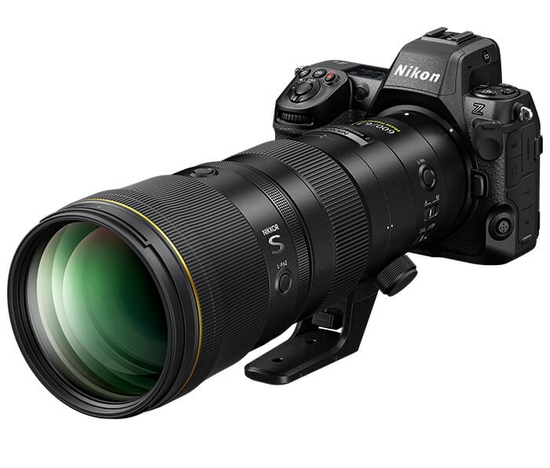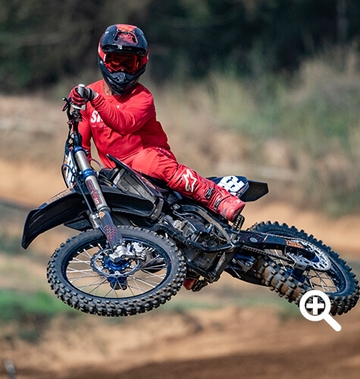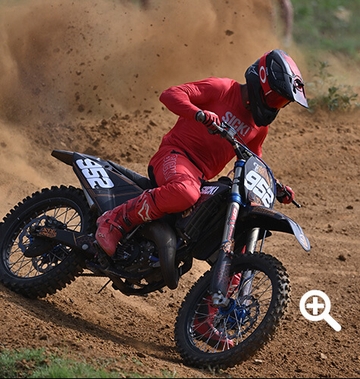Minimized size.
Maximized reach.

- S-LinePremium Optics
- 600mmSuper-TelephotoPrime
- 1390gLightweight1
- PFPhase FresnelElement
- VRImage Stabilization(6.0 stops)2
- Z MountFull-Frame/FXFormat
Gallery
Just 11 inches long and 3 pounds.
The NIKKOR Z 600mm f/6.3 VR S fits comfortably in most backpacks and carry-on luggage, and it's light enough to be shot all day with less fatigue.
Up to 6.0 stops of VR.
Versatile video performance.
Nothing holding you back.
Form meets function.

2 Built-in optical VR achieves an effect of shooting up to 6.0 stops* faster on a camera that supports Synchro VR and 5.5 stops* faster on all other Z series cameras.
*Based on CIPA Standard; in NORMAL mode; this value is achieved when attached to a mirrorless camera equipped with a 35mm film size image sensor.
Technology

ED (Extra-Low Dispersion) Glass
An optical glass developed by Nikon that is used with normal optical glass in telephoto lenses to obtain optimum correction of chromatic aberrations.

Short-Wavelength Refractive Lens
SR is a high- and specialized-dispersion glass lens that refracts light with wavelengths shorter than that of blue. By controlling short-wavelength light, the lens is able to achieve highly precise chromatic aberration compensation so that the colors in your images are more accurately reproduced. It also allows for more flexible optical designs, which allows for compact, lighter lenses to be designed.

Phase Fresnel
Phase Fresnel (PF) lens elements effectively compensate for chromatic aberration and ghosting when combined with ordinary glass lens elements. The PF lens element is based upon the Phase Fresnel lens, which appears to have a series of concentric circles engraved onto it. Utilizing a Phase Fresnel lens element allows Nikon engineers to use fewer lens elements, resulting in a more compact and lightweight lens. Due to the characteristics of a PF (Phase Fresnel) lens that utilizes the photo diffraction phenomenon, when there is a strong light source within the frame or when light enters the lens from outside of the frame, ring-shaped colored flare may occur according to shooting conditions. This phenomenon can be minimized with “PF Flare Control” to be included in Capture NX-D (ver.1.1.0 or later). For more information, see software Help/manual. Capture NX-D is available from the Nikon website. Be sure to keep your software up to date.

A/M
A/M stands for Auto-Priority Manual Mode. This mode also enables an easy transition from autofocus to manual during AF operation. However, mode switch sensitivity has been altered to reduce the possibility of sudden unintentional switching to manual focus while shooting.

Nano Crystal Coat
An anti-reflective coating developed by Nikon that virtually eliminates internal lens element reflections across a wide range of wavelengths. Nano Crystal Coat solves ghost effects caused by red light and effectively reduces ghost and flare caused by light entering the lens diagonally.

Fluorine Coat
Photographers need gear that can withstand the elements. Nikon’s fluorine coat effectively repels dust, water droplets, grease or dirt, ensuring easy removal even when they adhere to the lens surface. Nikon’s fluorine coat endures a high frequency of lens surface wiping and its anti-reflective effect also contributes to the capture of clear images.

Vibration Reduction
A Nikon in-lens technology that improves image stability by automatically compensating for camera shake. Lenses that offer VR will feature the abbreviation VR on the lens barrel.

Electromagnetic Diaphragm Mechanism
An electromagnetic diaphragm mechanism in the lens barrel provides highly accurate electronic diaphragm or aperture blade control when using auto exposure during continuous shooting.

Stepping Motor
NIKKOR Z lenses use a stepping motor for fast, accurate, smooth, quiet autofocus with reduced wobbling. This quiet drive system makes the lenses ideal for use when shooting video.

IF Lens
A NIKKOR lens in which only the internal lens group shifts during focusing. Thus, IF NIKKORS do not change in size during AF operation, allowing for compact, lightweight lenses capable of closer focusing distances. These lenses will be designated with the abbreviation IF on the lens barrel.
LCD, Video and Photo Gallery images are for illustrative purposes only
Tech Specs
Focal Length
600mmMaximum Aperture
f/6.3Format
FXVR (Vibration Reduction) Image Stabilization
YesApprox. Dimensions (Diameter x Length)
4.2 in.106.5 mmx11 in.278 mmApprox. Weight
1470 g
- Mount TypeNikon Z Mount
- Focal Length600mm
- Maximum Aperturef/6.3
- Minimum Aperturef/32
- FormatFX
- Maximum Angle of View (DX-format)2°40'
- Maximum Angle of View (FX-format)4°10’
- Maximum Reproduction Ratio0.15x
- Lens Elements21
- Lens Groups14
- Compatible Format(s)FX, DX
- VR (Vibration Reduction) Image StabilizationYes
- Diaphragm Blades9
- ED Glass Elements2
- Phase FresnelYes
- Fluorine CoatYes
- AutofocusYes
- Internal FocusingYes
- Minimum Focus Distance13.13 ft (4 m) from focal plane
- Focus ModeAuto/Manual
- E-typeYes
- Filter Size95mm
- Accepts Filter TypeScrew-in
- Approx. Dimensions (Diameter x Length)4.2 in.106.5 mmx11 in.278 mm
- Approx. Weight1470 g
- Lens TypePrime
Support
Product Registration
Registering your Nikon product allows us to send you (with your permission) important updates, service information and helpful hints, and it makes it easier should you ever need to call in for help.
Register your product online now.Nikon Answers Site
We store all resolved problems in our solution database. If you can’t find a relevant answer, feel free to submit a question to our technical support team.
View Questions & Answers




















